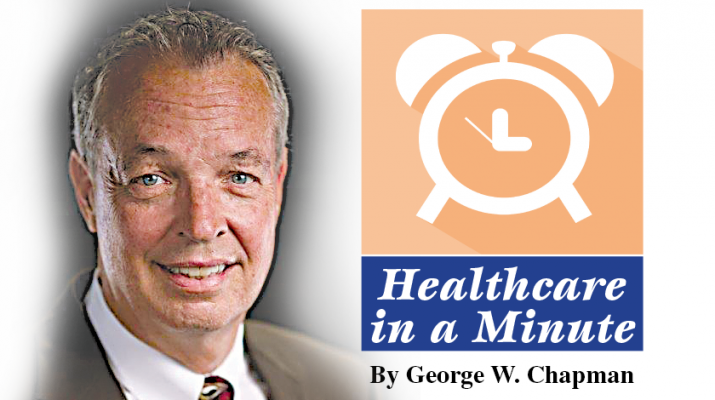By George W. Chapman
The short answer is: don’t hold your breath. A recent article in the New York Times by Reed Abelson explained. The Affordable Care Act (ACA) caps what commercial insurers can retain as profits. For small businesses and individuals, insurers must rebate “profits” over 20% of premiums. Profits include operating costs as well. For large businesses, insurers must rebate profits over 15% of premiums. Second quarter profits for major national insurers this year are almost double the second quarter profits of last year. Reported second quarter 2020 profits are $3 billion for CVS/Aetna, $2.3 billion for Anthem and $6.7 billion for United.
COVID-19 claims, (most are Medicare), are easily offset by the dearth of claims from elective surgeries, emergency rooms and office visits. The Trump administration is well aware of these excess profits which by any measure are expected to continue throughout 2020. Washington has “encouraged” the insurance giants to rebate anticipated excess profits or reduce premiums during this fiscal year instead of waiting to calculate year-end results. Industry observers predict: OK, good luck with that.
Before issuing any rebates, insurers are granted a three-year grace period following any fiscal year to be sure they have calculated all claims. In the meantime, individuals and businesses are struggling to pay their premiums and healthcare providers are struggling with the devastating negative impact of the virus on their bottom lines and staff.
Unrestricted Profits
As discussed above, the ACA caps profits on insurance lines of business. Written 10 years ago, the ACA does not restrict profits on other lines of healthcare business now owned and operated by the largest commercial insurers. Carriers have purchased or started up their own clinics and have merged with major drug retailers. Retailers like Walmart have even jumped into the insurance and clinic fray. To date, the current administration and a lot of politicians have provided mostly lip service to effectively controlling drug costs. A bipartisan bill written up in Congress last year, allowing Medicare/Medicaid to negotiate a couple dozen drug prices for starters, has yet to be presented to the Senate for a vote.
Telemedicine’s Future
COVID-19 is already considered a “black swan event” similar to other significant life changing occurrences — like both world wars, 9/11 and the launching of the personal computer. Up until the virus, telemedicine was ever so slowly being incorporated into the delivery of healthcare. Since the virus, telemedicine use has skyrocketed. Consumers are happy with the convenience and no copay. While some providers may still prefer office visits to virtual visits, all are happy with the enhanced reimbursement for telemedicine visits which, so far, are equal to an office visit. The billion-dollar question is: will enhanced reimbursement continue? The key is, what will Medicare do? (Commercial carriers tend to follow suit.) Right now, the enhanced reimbursement is authorized in 90-day segments. The current temporary 90-day authorization ends Oct. 31. I’m sure all provider group lobbyists (AMA, AHA, etc.) are pushing for permanency. Their efforts must be working. CMS chief Seema Verma recently commented, “Reversing course would be a mistake.” While it remains to be seen what ultimately happens, the signs are good for permanency. Verma noted that 9 million Medicare members have used telemedicine since the pandemic. Medicare paid providers $9 billion for telemedicine services in March and April this year versus only $60 million in March and April 2019. The virus has exposed and compounded our embarrassing lack of a national health policy. It’s been every state for themselves. Consequently, due to the lack of a national health policy providing some consistency across state lines, the governors from four western states: Washington, Colorado, Oregon and Nevada, are collaborating to improve, standardize and coordinate telemedicine access and coverage for their collective populations.
Veterinarians Are Flourishing
As we postpone or even cancel healthcare due to the ongoing pandemic, physicians and hospitals will continue to endure the financial strain. Quite ironically, veterinarians are flourishing. Unlike human care, trips to the vet are way up. A recent Associated Press story describes this phenomenon. Vet offices and animal hospitals are scrambling to increase staff, phone lines and office hours to accommodate the average 18% surge in pet care. According to pet health insurer “Trupanion,” July business was up 28% over last July. Industry observers and vets themselves attribute the increase in business to more people working from home, pets as emotional support, increased pet adoptions from shelters and price. Pet care is still primarily cash on the barrel head, so veterinary offices and hospitals are much more transparent with pricing as a third-party insurer is rarely involved, which normally introduces price confusion.
Private Practice Success
About half of all physicians are still in private practice. Despite the negative financial ramifications due to the pandemic, social media consulting firm PatientPop got enough physicians in private practice to respond to its survey. One of the survey questions asked for their non-financial indicators of success. Sixty-seven percent answered success meant a positive patient experience; 35% said effective patient communication; 30% thought strong or positive online reviews; 27% considered a high ranking in online searches to be an indicator of success; while 23% said their high performing website was an indication of success. When asked what frustrates them the most, 49% said dealing with myriad of insurers with their different fees, regulations and coverages; 33% said collecting what is owed them; 31% are frustrated with patient no-shows and cancellations (exacerbated by the pandemic); and 31% said dealing with compliance and related expenses.
George W. Chapman is a healthcare business consultant who works exclusively with physicians, hospitals and healthcare organizations. He operates GW Chapman Consulting based in Syracuse. Email him at gwc@gwchapmanconsulting.com.

